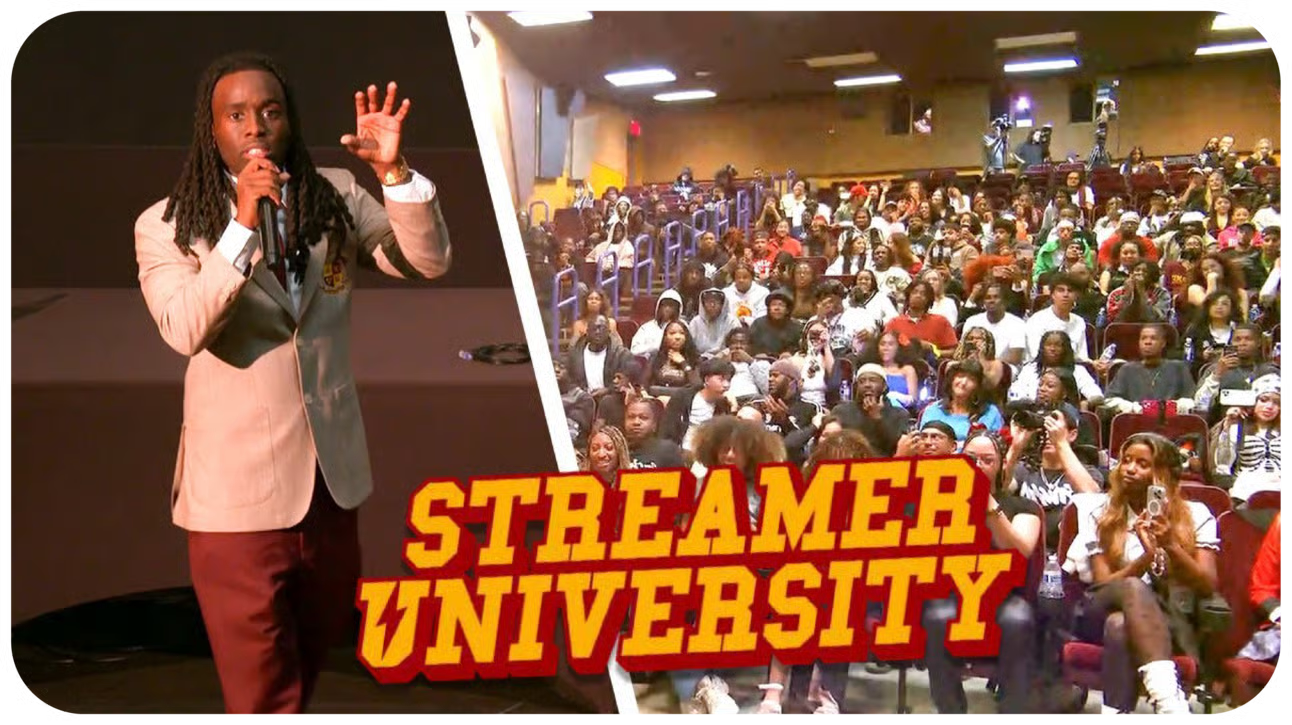.jpg?alt=media&token=c2bbe7be-52fe-4fa6-a9ed-d454fc05076c)
If Aristotle were alive today, he might have swapped the Lyceum for a Twitch channel. Instead of strolling through the Athenian gardens, he’d be pacing in front of a ring light, preaching to a digital chorus about virtue ethics while spamming “W Aristotle” in his own chat. And if that sounds ridiculous, welcome to the new academic commons: the streaming era.
Kai Cenat—comedian, chaos conductor, and arguably the biggest name in livestreaming—has become something of a reluctant dean of what the internet now jokingly calls Streamer University. His “campus” isn’t ivy-walled but LED-lit, not quiet but deafening, and the tuition? Whatever your Wi-Fi bill is this month.
And the students? They’re not just fans in his chat. They’re real-deal college students, logging out of lecture halls only to log back in as part-time streamers, content creators, and digital hustlers.
The Campus That Never Sleeps
Step onto any modern campus—NYU, Michigan, Arizona State, Howard—and you’ll see it: ring lights crammed into dorms, tripods leaning in the corner, posters replaced by green screens. Half the cafeteria line is debating midterms, the other half is whispering about OBS settings.
It’s not about “going viral” anymore. For Gen Z, livestreaming is a lifestyle, a side hustle, and in many cases, a second education. As The Atlantic’s Ian Bogost once wrote about video games, “We play not because they are real, but because they are serious.” The same can be said for streaming—nobody thinks a Twitch stream is “real school,” yet students treat it with the seriousness of an unpaid internship.
One Temple University student summed it up on TikTok:
“Lecture ends at 4. Stream starts at 5. I’ve got two bosses—my professor and my chat.”
Kai Cenat: Dean of the Digital Dorms
Kai didn’t set out to build a university. He just wanted to be funny, and he was—so funny that millions tuned in. But something happened along the way.
His streams became more than entertainment; they became a curriculum of sorts:
-
Lesson One: Hustle beats pedigree.
-
Lesson Two: Attention is currency.
-
Lesson Three: Community is capital.
In Kai’s world, failure isn’t flunking a test—it’s losing momentum. Success isn’t a GPA—it’s subs and superchats.
And whether they know it or not, college kids are taking notes.
Philosopher Michel Foucault might call it a “discipline of visibility”—where the panopticon isn’t a prison but your audience. Every click, every donation, every emoji is surveillance with benefits.
Streaming as the New Side Hustle
Forget bartending or tutoring. Today’s students are chasing affiliate codes, Twitch payouts, and Patreon subscribers.
Why? Because the math makes sense.
-
The federal minimum wage: $7.25/hour.
-
The average Twitch streamer with 100 subscribers: ~$250/month plus tips.
-
The top 1% (where Kai lives): millionaire status.
It’s no wonder students are tempted. As author and cultural critic bell hooks once wrote, “Education is the practice of freedom.” For these students, streaming is freedom from the nine-to-five treadmill before they even step onto it.
But here’s the rub: streaming isn’t passive income—it’s labor-intensive, emotionally draining, and brutally competitive. Most never make more than coffee money.
And yet, the allure remains.
Culture Clash: Professors vs. Streamers
One sociology professor at Rutgers recently quipped, “I lose students to Fortnite more than I lose them to flu season.”
The cultural clash is real. Professors assign essays; Twitch demands immediacy. Academia rewards depth; streaming rewards consistency. Students learn to navigate both worlds, often with brutal compromises.
A sophomore from UCLA put it best:
“My professor says I’m plagiarizing when I quote memes. My chat says I’m recycling when I repeat jokes. Either way, I can’t win.”
The Philosophy of Streaming
Let’s not kid ourselves: streaming is more than just goofy dances and gaming marathons. It’s a real-time existential performance.
Nietzsche once asked, “What is the artist but he who creates out of chaos?” Streamers live that chaos daily—juggling lag, trolls, and the relentless demand for content.
In a way, college streamers are practicing philosophy without knowing it:
-
Camus’s absurdity: Keeping your audience entertained while your homework pile grows.
-
Sartre’s authenticity: Being “real” on camera while branding yourself.
-
Kierkegaard’s anxiety: Waiting for the viewer count to rise, one notification at a time.
The Economics of the Streamer Dorm
On campuses, dorm rooms are now production studios. One student uses their closet as a sound booth. Another split their rent by rooming with a fellow Twitch affiliate—half the space, double the content.
Kai’s influence trickles down not just in catchphrases but in monetization strategies:
-
“Subathons” rival frat parties.
-
Dorm-based merch shops thrive.
-
Group projects? Now they’re “collabs.”
If universities were smart, they’d build “streamer lounges” instead of computer labs. But then again, can you imagine a Dean of Twitch?
How-To: Start Your Streamer University Career
Pick Your Platform: Twitch, YouTube, Kick, or even Instagram Live.
Gear Up Smart: Don’t blow your financial aid check. Start with a webcam and free OBS software.
Find Your Niche: Gaming, commentary, music, comedy—your audience needs a reason to choose you over a thousand others.
Stay Consistent: Treat it like a class schedule. Miss streams, and your “attendance grade” (viewership) drops.
Engage, Don’t Perform: Audiences want connection, not just entertainment. Talk to them.
Protect Your Mental Health: Remember, burnout is real—even Kai Cenat logs off sometimes.
FAQ: Kai Cenat’s Streamer University
Q1: Is “Streamer University” a real school?
A: No, it’s a cultural nickname for how college students are balancing streaming with academics, inspired by Kai Cenat’s success.
Q2: Can streaming pay my tuition?
A: For a lucky few, yes. For most, it’s side income at best. Don’t drop out banking on it.
Q3: Do professors take it seriously?
A: Some see it as a distraction, others as a form of entrepreneurship. It depends on the campus culture.
Q4: What makes Kai Cenat special?
A: Charisma, timing, and relentless consistency. He’s both entertaining and relatable—a student once himself, now the internet’s class clown-in-chief.
Q5: How do I keep up with school and streaming?
A: Time management. Treat streaming like a job with shifts, not a 24/7 lifestyle.
The Last Word
Kai Cenat didn’t ask to be the dean of Streamer University. But he is. His chaotic, brilliant streams have inspired a generation of students who see the lecture hall and the livestream as equally valid classrooms.
The big question isn’t whether streaming can coexist with academia. It’s whether academia will adapt—or risk losing its students to a digital campus that never sleeps.
As Marshall McLuhan once wrote, “The medium is the message.” For Kai Cenat’s students, the message is clear: the medium isn’t the lecture hall anymore—it’s the stream.
And for better or worse, the syllabus is being rewritten in real time.
Suggested for You

Kai Cenat’s Streamer University: Chaos, Culture, & the New Classroom of Internet Stardom
Reading Time: 6 min
A deep dive into Kai Cenat’s Streamer University: what it promised, what really went down, cultural ...
Read More →
The New Wave of Content Creators: From Music to Fitness and Everything In Between
Reading Time: 6 min
Explore the diverse world of content creators making waves in 2025, from musicians like DDG to fitne...
Read More →
Xbox in 2025: The Console That Won't Quit
Reading Time: 6 min
Explore the latest in Xbox news, trending players, and gaming setups in 2025. From Game Pass to Seri...
Read More →
Shedeur Sanders: From Draft Day Drama to Browns' Rookie Quarterback
Reading Time: 6 min
Shedeur Sanders' journey from a late-round draft pick to a viral sensation with the Cleveland Browns...
Read More →
Comments